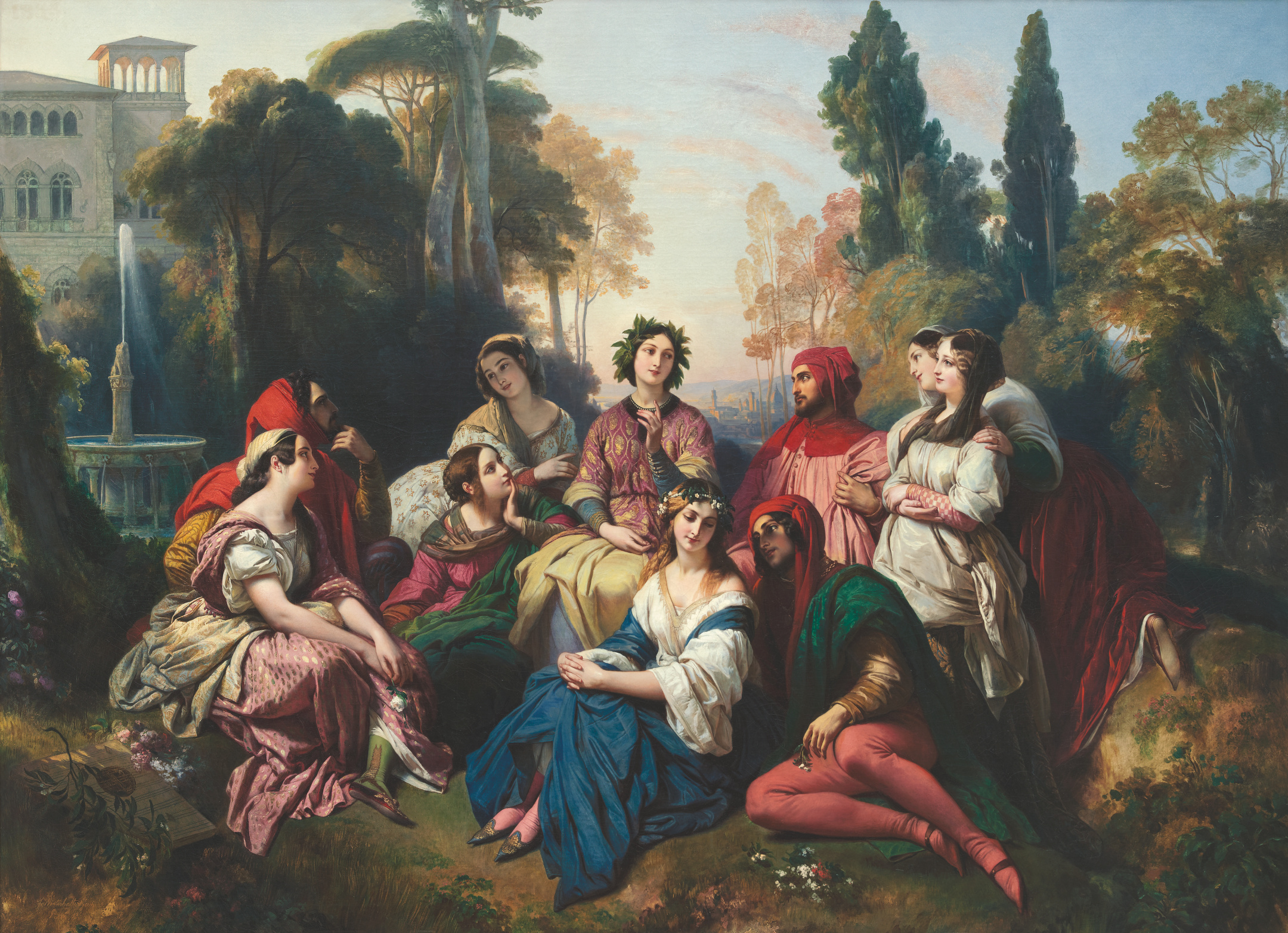 |
| Plague Covers |
Xavier de Maistre, A Journey round my Room, 1794
Geraldine Brooks, Year of Wonders, 2001
Giovanni Boccaccio, The Decameron, c. 1350
Quarantine
Origin: mid 17th Century; from Italian quarantina 'forty days', from quaranta 'forty'
If there's one thing, Dear Reader, we all learned this past year, it is the definition of the word Quarantine. In varying degrees, I expect we all had a chance to find out what forty days at home might even feel like, and probably all came to the conclusion that whoever put the quaranta into it was either wildly optimistic or just deluded. And, for some, confinement may have been a better word for what ensued.
Anyhoo, in the expectation that no time could have been riper, Your Correspondent seized the opportunity to join hands across the centuries with a couple of writers who had their own take on Staying In for a bit, and one modern author who could not have been more prescient in her choice of subject. And appreciating you may be over even reading about these times, I shall merely briefly survey how they fared:
 |
| Our traveller Xavier taking in the sights |
42 Days: Xavier de Maistre was a a young soldier based in Turin in 1790 when he was confined for forty-two days under house arrest for duelling. He parodies his time as a travelogue, and in
A Journey round my Room, he luxuriates in exploring his thirty-six-pace perimeter bedsit, admiring and discoursing on its fixtures, furnishings and bibelots, digressing and pontificating as though on a Grand Tour.
Verdict: He emerges sane and refreshed at the end of his six-weeks, enabled, of course, by the unwavering companionship of his dog and reliability of his loyal valet who could interface with the outside world for him, with a book under his belt and wholeheartedly recommending this style of Voyage for its frugality and comfort for those with limited means or mobility.
 |
| Eyam in happier times in the early C19th |
425 Days: Geraldine Brooks, Year of Wonders, is a positively marvellous fictional account of the true story of the small village of Eyam that self-quarantined for a full year when Bubonic Plague came to them for around fourteen months in 1665-6. The story is seen through the eyes of a housemaid who finds herself rising to the occasion and through necessity self-training as a nurse and herbalist as those around sicken and die. Self-sacrifice, selfishness, superstition and survival are explored in this extraordinary tale.
Verdict: Our fictional heroine, one of the survivors, takes on all the shocks and challenges this disaster throws at her and finds that the year, after all, is for her one of wonder. And the real-life village taught doctors valuable lessons in enforced quarantine zones and contamination minimisation, also wonderful. And a 2001 novel about the strange ills of the past that became suddenly very topical again - how could Ms. Brooks have known it!
 |
Such a genteel escape from the Black Death
Franz Xaver Winterhalter, The Decameron, 1837 |
14 Days: Ten affluent young Florentines flee to nearby Fiesole for fourteen days to escape the Bubonic Plague of 1348 and amuse themselves by each telling a story based on a particular theme every weeknight. The 100 stories Giovanni Boccaccio cobbles together are indeed sourced from throughout the preceding ages and many lands, but brought a bit up-to-date (viz. C14th-style) with some local flavour and were probably recognisable to contemporary readers. They are in turns bawdy, lewd, pious, irreverent, violent and a source of great delight and admiration to the ten storytellers. Then, amused and uplifted, they all go back home. [Nota bene: Extensive show-notes accompany this Norton Critical Edition]
Verdict: Do we care? If it wasn't for the entourage of servants that rolled out the red carpet every day for these ridiculous, self-indulgent and pompous youths and they had to fend for themselves for the duration - it's every man for himself when the plague strikes the Middle Ages - they'd probably have perished.
I do realise this is fiction, obv. and I'm sure Signore Boccaccio probably wrote this as a bit of escapism from the awfulness of living though the Black Death, but did he expect that centuries later this book is still lauded as a masterpiece?? Frankly, Chaucer would have probably come up with enough inspiration for his Canterbury Tales without the leg-up from this nonsense. Pity the poor students who have to critique this. And that careers have been made as Decameron-experts astonishes me. The show notes are just as self-indulgent. Reading this, I took one for the team*.
Conclusion: Does quarantine accurately live up to what is promised on the box? No. Xavier came closest with 42 days, but it was house arrest not escape from pestilence that confined him thus. Unless 40 days is re-instituted as the prescription, Pipistrello thinks it's time for a name change.
* Why I'm all phooey with The Decameron will come as a future post!
Image credits: 1: Flying With Hands; 2: via Internet Archive; 3, 4: Wikimedia Commons





Wonderful reviews! I hadn't heard of de Maistre before, and will have to investigate. I also haven't read Geraldine Brooks's book, which is a shame because I know her and she is as lovely a person as she is talented a writer.
ReplyDeleteEagerly awaiting the full evisceration of The Decameron.
TofF: Thank you, and I, ahem, helpfully provided a link to an English-language version of ol' Xavier's novella on the free joy that is the Internet Archive, which is why it's highlighted in red. You may prefer to try a French version? And I must ask, you know GM as in a friend? Do tell!
ReplyDeleteI know the Plague village of Eyam having grown up not too far away. I have walked the walk that the people of Eyam took during the plague to their village boundary stone. The boundary stone was where other nearby village people would leave food and medicine for them during their isolation. The boundary stone still exists, it has several holes drilled into it. These were filled with vinegar in order to disinfect the coins left by the people of Eyam in exchange for the food and medicine.
ReplyDeleteHello Pipistrello, I don't think that I would particularly seek out books about quarantine during a period of quarantine. I have just read my usual selection, which has taken me all over the world and to several time periods. This gives an air of openness and freedom, instead of confinement. As part of my late-night rereading program (the most boring books will keep me awake if they are new to me), I just read a couple of old Ellery Queen mysteries. Even being "quarantined" in a locked room with no access in or out, these people still managed to die!
ReplyDelete--Jim
ARE YOU TELLING ME AUSTRALIA IS GOING BACK INTO LOCKDOWN?
ReplyDeleteI LOVE THAT YOU FOUND BOOKS TO READ ON THE SUBJECT!
I THINK YOU ASKED HOW WE ARE DOING WITH IT?
FINE...........I HAVE PLENTY HERE THAT KEPT ME BUSY!
I WAS AMAZED AT HOW FAST THE DAYS WENT BY...........
WE ARE OUT OF IT NOW AND SEEM TO BE MOVING AROUND MORE!THE ITALIAN TOLD ME LAST NIGHT NO MORE MASKS WHEN OUTSIDE OF SHOPS!
IT WILL BE FUN TO SEE LIPSTICK AGAIN!!!
HANG IN THERE!!!
XXX
I JUST LOST MY COMMENT!
ReplyDeleteHAD TO DO THE MATCHY THING 12 times before it took........just letting you know and I DID IT RIGHT!
IF YOU CAN CHANGE YOUR COMMENT FORMAT THAT WOULD BE GREAT!
AS I THINK YOU ARE MISSING OUT ON A LOT OF OTHER COMMENTS!
I LOVED ThAT YOU FOUND BOOKS TO READ ON THE SUBJECT!
ARE YOU GOING BACK INTO LOCKDOWN AS I CALL IT?
THAT's A SURPRISE TO ME!
BE WELL.........XXX
Rosemary: Eyam's plague story is truly incredible. When I was hunting about for pics, google offered up your Eyam post for my delectation and I saw your photos! There were also photos of other boundary stones around England that had holes for vinegar-ing coins, but I didn't stop to investigate whether they came before or after 1665, but at first blush it sounds like it was a well-known disinfection idea.
ReplyDeleteJim: I do like your assessment of the reads that have recently passed through your hands. In all honesty, I'd been seduced by the familiar Decameron imagery and my pop-knowledge of the characters and thought the book was going to be something quite quite different. It's too easy to fall foul of this when the lofty pontifications (even or especially about a piece of art) take on a life of their own, far removed from their object ... I've not read Ellery Queen but am delighted to report that an introduction to Dorothy L. Sayers was a joyful result of a Comments Department recommendation! Plenty of pleasures to be had in old mysteries, whimsical and otherwise.
Contessa: It is poor ol' Melbourne that is having another week's lockdown. The rest of the country is fine ... Yes, lipstick sales will probably go through the roof now! Having your lovely garden and critters for company would make the passage of time a smooth one, you were/are indeed fortunate ... The comments situation is annoying. I shall try putting it back the way it used to be but, from memory, it might cause you problems again as you don't use a google login? xx
This made me think of Julian of Norwich who spent most of her life in a small cell. I suppose after the first few years of confinement it becomes 'normal'. After a whole year of self-imposed Covid-confinement, it's beginning to feel 'normal' for us too.
ReplyDeleteCro: Ah, the lives of the hermits and devout are a whole and ongoing story in themselves. I wonder if any have published works about their confinements that are more off-topic from their day jobs? Mystical writings didn't really come across my reading radar this time around ... We are adaptable creatures, to be sure, and perhaps one's 'normal' is always meant to be a moveable feast?
ReplyDeleteEva (via email):
ReplyDeleteHello from Lockdown Melbourne Pipistrello!
During the last lockdown I read the delightful A Gentleman in Moscow ( noted on your list) and concluded that if one can spend thirty years not leaving a hotel one can surely tolerate these current restrictions. And although a work of fiction, as the writer says: if a man does not master his circumstances, then he is bound to be mastered by them.
When one can still retreat into the world of books and beauty, quarantine is bearable.
Thank you
Eva
Eva: How right you are! You and Jim both have expressed quite what I feel about the opportunity this past while gave us to really throw ourselves into the world of books and beauty for slightly different reasons to those everyday. And isn't the Moscow Gentleman such excellent company? Such the right (fictional) attitude!
ReplyDeleteOdd that you wrote this post without one mention of the word "Venice" where it all started. The Lagoons and the "waiting areas" on the islands are, I suppose written about somewhere. Graffiti on the walls left behind show that quarantine varied from 40 days upwards to 54 days.
ReplyDeleteRachel: Thank you and that is such a good point. They did take quarantine rather more literally, but I confined my reflections on the whether the 40 days was strictly adhered to in light of the books I recently read. As you say, there must be something where it's written about but off the top of my head I can't think of any novels set in Venice in plague-times.
ReplyDeleteDid Xavier share any details on his Duel prompting his confinement? I think a return to public hangings might be the only thing that can curtail our (USA) public crime since our leaders are too Woke to even acknowledge. Also, a return of the days when the question of a man's honor was worth risking death over as Tolstoy noted: "commenced following day at Dawn with pistols for 2 and coffee for 1".
ReplyDelete-in quarantine reading about various quarantine scenarios, eh? You're made of tougher stuff than I! (However, Xavier's 'imprisonment' sounds like a rather humorous read.)
ReplyDeleteGSL: Xavier only mentions that an affair of honour needed settling, and that this most reasonable custom met with people who disapproved of so praiseworthy a cause. Various scenarios were given as a likely for inst.: your toe being trod upon, a bitter word during a moment's vexation, or your lady-love giving favour to another ... Tolstoy certainly had a measured approach to planning one's day and could never be accused of wasteful over-catering. Rather civilised, really!
ReplyDeleteBea: And though the reading list for such endeavours is not solely confined to these three ("Love in the time of Cholera" as another for inst. and Rachel mentioned Venice and there'd have to be at least something set there), for the time being I'm classified as Done ... As Xavier probably never intended his manuscript to be published, it was his brother who sent it forth into the world, playfulness was the order of the day!
THE book on quarantine is "The Plague" by Camus. It is a story of a town in lockdown for a year due to plague and what the people do.. I recommend it.
ReplyDeleteI always love me a good recommendation and, dear Ur-spo, I may have said to Bea that I'm Done with more confinement reading but this will be going onto The List!
DeleteAre you still in quarantine?
ReplyDeleteHere in Sydney, dear Ur-Spo, life is pretty Normal and has been for ages - if you except one's ability to travel beyond our shores as being Normal - but Poor Melbourne is quarantined at the minute. However, our national numbers are minuscule on the global scale.
DeleteBeautiful blog
ReplyDeleteVery kind of you to say, thank you.
Deletehey, any updates?
ReplyDeleteMusings and stuffs always in the pipeline - like buses, you can wait for an age for a post to arrive here and then three will roll up in a rush.
DeleteYes, Pipistrello - d'accord with your request of re-naming.
ReplyDeleteWords are so powerful, sometimes putting us into a veil, sometimes enlighten us - and trying to be honest in using language is a wonderful start (always keeping in mind that reality is wafting in everyone's mind in a slightly different way).
I am not sure whether I will find time two read at least two of your referred three interesting books - I am glad when I have managed to fix the last white planks into the Billy-boards of Ikea - trying to give my swirling life and some of my books a solid basis (hahaha: on an Ikea-plank -- hahaha! Well, life (I am NOT talking about age) is making me (sometimes) a little bit more modest... :-)
And grateful.
For example: happy that now I have Internet again - communication can start again - bliss.
Dear Britta, welcome back to the digital world! I do like your reminder about the power of language, so nicely put. Yes, this tendency toward pedantry is really only an attempt to fix things straight in my own reality, as I do like the proverbial labels all facing front in my word cupboard, hahah!
DeleteAs to the confidence that Billy will put a solid floor under your world, I can attest that my Billy (who never owned one?), gamely assembled aged around 18, may have resembled Pisa's leaning tower all its days, but never once failed me over many years and many house moves. Wise choice!